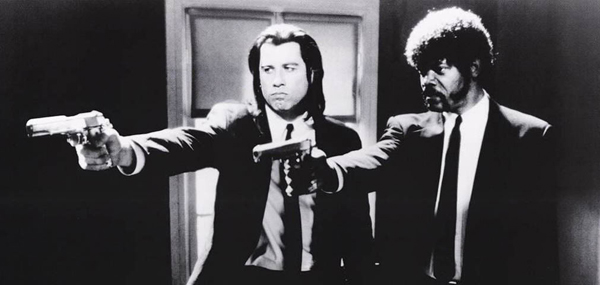Internships are frustrating for everyone.
When you’re applying for internships, it can be demoralizing to find out that no one wants your labor even for free. Even though – unless you have rich parents – you will very possibly have to work some second, paying job (folding jeans at the mall!) in addition just in order to be able to afford to work for free! And you still can’t give your damn labor away!
This has a lot to do with how most labor in this country is now intangible.
If you were an apprentice making tables, well, sure … your tables wouldn’t be as good as those made by a master. But, still: no one can claim you didn’t make a damn table. If it’s got a platform on approximately four legs, you did something! You are officially more than just a nuisance to have around.
But most interns’ position is more like, “I want to work in the music industry so bad I’ll do anything!” Anything? Like what? You’ve got a degree in Communications or something … so someone’s going to sit you down in a chair and let you write MTV’s press releases? And it’s not actually even possible to make coffee for eight hours per day.
From the perspective of the employer, not only are interns fairly useless – since it takes three months to get up to speed on most knowledge tasks, and that’s as long as the intern will be there – you also can’t just use them for the grunt work they are actually able to do, because if you actually ask the intern to just go pick up your prescriptions and some art supplies for your kid’s project so you can do the important work yourself, your intern will probably bitch about you on the Internet.
Obviously, there are exceptions – some sectors (i.e., finance) have very well-defined internship programs that are really proving grounds for full-time positions. And some internships are just meant as philanthropy, intended as wonderful experiences for a handpicked crop of fresh, young whippersnappers. Good luck getting one of those! (See Bullish: The Resume Wall Street is Laughing At.)
But for the rest of us – how the hell do you get your first toehold in the working world when you can’t even work for free?
Let’s see a letter from a writer I’ll call Catherine de’ Medici:
Hi Jen,
I’m in need of some Bullish advice.
I know you’ve written a lot about applying for things that don’t yet exist/aren’t advertised.
There is an art museum that I would desperately like to intern/work at but they don’t have an internship program. The website only has a general info email address to contact and the chances of them saying yes are very slim.
I was thinking that I probably need to contact someone high up in the organization who had the power to say yes despite there not being an internship program. I mean, the person most likely to say yes is probably [a famous person] himself, but I think there is very little chance of me getting in contact with him.
So, I guess what I’m asking you is: 1. How to find out who to contact and 2. What sort of things should my email include to make them say yes?
I would like to intern there in the first half of next year, so I thought that asking them far in advance might be good because they’re more likely to say yes.
I know this is very specific, but even some general tips in how to pitch a new job would be so very useful.
Thanks,
Catherine
Catherine and I had spoken before, so I knew that she had a lot going on. For instance, while still in college, she’d been giving talks about art.
That’s interesting, right? Let’s talk about art lecturing for a moment. I write about building expertise all the time. It is also true that expertise is relative. You don’t need to be Michael Phelps to be an expert at teaching kids to swim. Half an art history degree will confer upon you much, much more than most regular people know about art.
To teach something, you want to be at least 2-3 levels above your audience – that’s it. There’s no reason a young English major couldn’t offer, “Shakespeare for Total Beginners.” Who knows who’ll show up? When I’ve done my nerdy one-woman shows, I’ve attracted plenty of simpatico fellow nerds, but also plenty of older people who just like to go to free events. Oh, and nerdy kids whose parents are trying to show them that THERE’S A GLORIOUS NERD FUTURE AHEAD. (There is!)
And what if someone shows up knowing more than you? No problem! It can build credibility to acknowledge what you don’t know. One of my favorite phrases is, “I’m not an expert in that topic,” which implies that I don’t bullshit or speculate, so when I do say something definitive, it’s fucking definitive.
If I were a twenty-year-old teaching “Shakespeare for Beginners” at my local YMCA, leading a senior citizen and a twelve-year-old through a shaky reading of Titus Andronicus, and some professor showed up and offered her two cents, I’d say, “Is that so? Interesting!” and that I was honored that she’d attend a beginner-level workshop, and then move back to what I was doing. There’s no shame in being at level 7 out of 20 and genuinely helping people at level 3.
Oh, and I’ve never been an intern. In college, I taught myself HTML, got some part-time jobs making websites (in a text editor, which was the only way to do it in 1998!) and then some local businesses as clients, and then I started hiring people (see Bullish: Three Career F*ckups I Made So You Don’t Have To.)
In other words, I used my copious free time and general sense of disenfranchisement to teach myself a skill that older people were unwilling or unable to learn.
I never took a computer programming class – although I did drop out of one after a few days because it was too hard. And yet I was still able to use online tutorials to teach myself a skill that allowed me to make $40,000 during my senior year of college. No one’s A+, internship program, or official stamp of approval was required.
Even if your goals require participation in large corporations – truly, some things cannot be done in a DIY manner – there’s nothing like mastering some important, difficult, trackable, quantifiable, real skill so that you have something to offer other than, “I’ll do anything!”
Something like “marketing” or “writing” is much too broad and nebulous and common and not-frightening to regular people. Master something like Google Analytics, or search engine optimization, or writing marketing Tweets that get 225% more clickthroughs once your proven techniques are employed.
Show me a spreadsheet of how many people clicked on Tweets about yogurt before you started experimenting, and how many people clicked afterwards, and how using a Twitter feed to post the first sentence of each entrant’s entry in the yogurt-sonnet contest actually illustrates a general principle that you could also apply to my (non-yogurt-based) company.
If you’ve got one of these kinds of skills – I’ll do Shakespeare for Beginners seminars at your event space, or I’ll analyze your Google ad spending and help you get better results for less money – you don’t need to pitch yourself as an “intern.” Just pitch that service. “I’ll do a useful and amazing thing for you for free.”
Politely say what you want to get out of it, otherwise it’s weird (like when someone randomly gives you an expensive gift and it’s just awkward). As in, “I’ve done this for my university and for the local Some Kind of Club, but I want to work in nonprofits and hope that you’ll like my work enough to let me use you as a reference in the future.”
So, here’s what I wrote to Catherine:
Hi Catherine,
The reason cool places don’t want even free interns is because interns often take more time to manage than they’re worth, and don’t know how to do anything useful (and then complain when what they actually are asked to do isn’t important.) So, DON’T SAY “INTERN.” OR INTERNSHIP. Or “recent college graduate.”
Instead, concoct something like, “I’ve started a new consultancy and am looking for a small number of high-profile clients to offer my services to pro bono in order to build my portfolio,” or suggest some really specific project you’d like to do for them and in which you are somehow an expert (creating a podcast walking tour of the museum, or a museum scavenger hunt for kids, or a museum tour for the blind, or giving interesting talks, or whatever). Once you’ve done the one project, you could propose another.
I’m not sure how to find the right person to contact — this famous dude who is supposedly the head of the place probably has some other, very competent person who actually works 40+ hours a week and responds to messages and such.
The right email to the general email address might get you in touch with this person. But don’t say that you’re a recent grad or a college student or any of that. Sound like a reasonable peer of whomever you’re talking to. Someone who sends emails like this all the time.
Aren’t you technically, already, an “art lecturer”? Go with that. Maybe you’re an art lecturer hoping to give a talk at the museum related to some specific exhibit at the museum right now. And obviously it’s kind of time sensitive, since exhibits are up for limited periods of time.
Jen
I don’t know much about art, so perhaps my suggestions are a bit wacky. I didn’t really mean “scavenger hunt” in the sense of, “Everybody look for candy in the sculptures’ armpits!” I meant it more like, “Who painted the painting where baby Jesus is holding a snake?! Go find it and write down the painter’s name in the blank!” That sounds less destructive.
Catherine wrote back:
Thank you! I hadn’t even thought of positioning myself as anything other than an intern or low-level employee, maybe because I am young. I guess I need to have more faith in myself. It’s a slightly scarier and certainly more Bullish approach. I will spend some time thinking of suitable projects to pitch and then a little more time getting up the nerve to send them!
Incidentally, I espoused much the same position to a friend who was switching careers and considering applying for a journalism internship, even though it would be a lot of hours and it wasn’t clear that she’d be able to actually publish much.
Wisely, instead of applying to be an intern, she found the right contact person and pitched an article based on the expertise she built up in her first career. Her work was really good. Boom, now she’s a journalist, and moderately famous on the Internet … all in under 60 days!
I will reiterate the advice Catherine referenced above: Do things that don’t have applications.
Some of the most mediocre opportunities have the most competition. (Hint: If the opportunity is advertised, it’s probably not much of an opportunity. The laws of supply and demand don’t work that way.) The best opportunities are the ones you invent.











